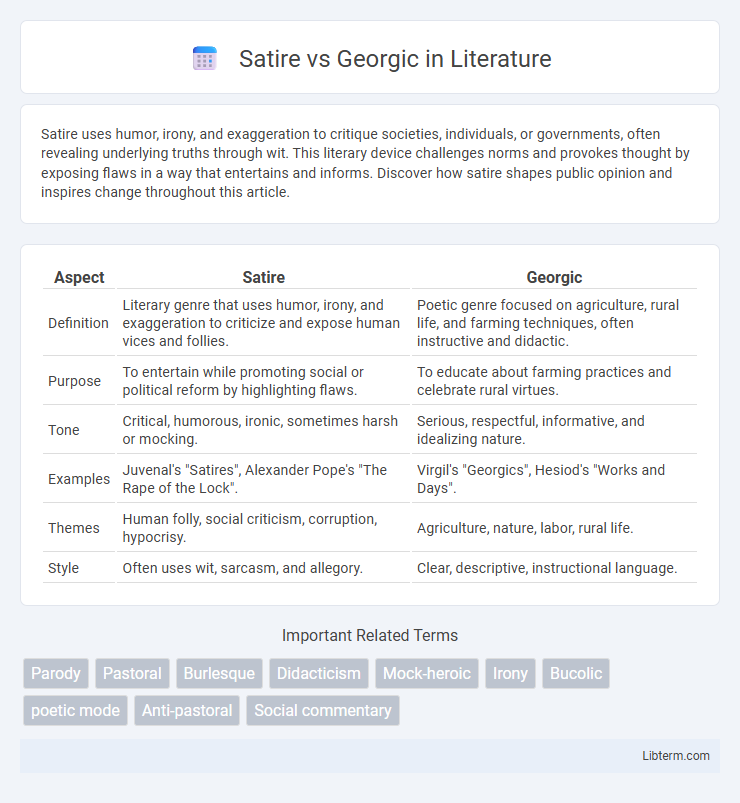Satire uses humor, irony, and exaggeration to critique societies, individuals, or governments, often revealing underlying truths through wit. This literary device challenges norms and provokes thought by exposing flaws in a way that entertains and informs. Discover how satire shapes public opinion and inspires change throughout this article.
Table of Comparison
| Aspect | Satire | Georgic |
|---|---|---|
| Definition | Literary genre that uses humor, irony, and exaggeration to criticize and expose human vices and follies. | Poetic genre focused on agriculture, rural life, and farming techniques, often instructive and didactic. |
| Purpose | To entertain while promoting social or political reform by highlighting flaws. | To educate about farming practices and celebrate rural virtues. |
| Tone | Critical, humorous, ironic, sometimes harsh or mocking. | Serious, respectful, informative, and idealizing nature. |
| Examples | Juvenal's "Satires", Alexander Pope's "The Rape of the Lock". | Virgil's "Georgics", Hesiod's "Works and Days". |
| Themes | Human folly, social criticism, corruption, hypocrisy. | Agriculture, nature, labor, rural life. |
| Style | Often uses wit, sarcasm, and allegory. | Clear, descriptive, instructional language. |
Understanding Satire: Definition and Purpose
Satire is a literary genre that uses humor, irony, and exaggeration to criticize or expose human vices and follies, aiming to provoke thought and reform societal behavior. Unlike Georgic poetry, which emphasizes agricultural instruction and moral reflection through nature, satire targets social, political, and cultural issues with a sharp, often witty tone. The primary purpose of satire is to challenge and improve society by highlighting its flaws in a compelling and engaging manner.
What is Georgic? Origins and Characteristics
Georgic poetry originates from the ancient Roman poet Virgil's work "Georgics," which emphasizes agricultural themes and practical instructions for rural life. It combines didactic purpose with poetic elegance, focusing on the relationship between humans and nature, seasonal cycles, and farming techniques. Unlike satire, which critiques society through humor and irony, georgic poetry offers a respectful and instructive portrayal of agrarian labor and the natural world.
Historical Context: Satire and Georgic in Literature
Satire and Georgic evolved as distinct literary genres in ancient Rome, with Satire emerging through Horace and Juvenal as a critical commentary on social vices and political corruption. Georgic poetry, exemplified by Virgil's "Georgics," focused on agricultural life and rural virtues, reflecting Rome's agrarian values during the Augustan period. These genres highlight contrasting approaches to literature: Satire's sharp social critique versus Georgic's idealization of rural labor and harmony with nature.
Key Themes in Satirical Works
Satirical works often revolve around themes such as social criticism, human folly, and moral corruption, exposing hypocrisies and societal flaws through humor and irony. Key motifs include the ridicule of political power, the corruption of institutions, and the absurdities of everyday behavior, contrasting sharply with the Georgic genre's focus on agriculture and rural life. This makes satire a powerful tool for societal reflection and reform, targeting human vices rather than celebrating nature and hard work like Georgic poetry.
Central Motifs of Georgic Poetry
Georgic poetry centers on motifs of agriculture, rural labor, and the harmonious relationship between humans and nature, emphasizing practical knowledge and the moral value of toil. It contrasts with satire by adopting a serious, instructional tone that celebrates the rhythms of the natural world and the virtues of simplicity and self-sufficiency. Key themes include seasonal cycles, the cultivation of land, and the ethical dimensions of farming life.
Literary Techniques: Satirical Tools vs Georgic Devices
Satire employs irony, sarcasm, and parody to expose human follies and societal flaws, using exaggeration and wit as primary literary techniques to provoke critical reflection. In contrast, Georgic poetry utilizes didactic language, detailed imagery, and structured verse to instruct readers on agricultural practices and rural life, emphasizing harmony with nature. While satire disrupts norms through humor and critique, the georgic relies on clarity and reverence to convey practical knowledge and moral values.
Major Works: Influential Satire and Georgic Examples
Juvenal's Satires stand as influential examples of Roman satire, sharply critiquing societal vices and corruption, while Virgil's Georgics exemplify the georgic genre by blending agricultural instruction with poetic elevation of rural life. Horace's Satires offer a more humorous and personal tone, contrasting with Vergil's didactic yet lyrical approach in the Georgics, which deeply influenced later agricultural poetry. These major works highlight the distinct purposes of satire--social critique--and georgics--practical and philosophical reflections on farming and nature.
Purpose and Audience: Satire vs Georgic
Satire targets audiences familiar with social norms, aiming to expose human vices and follies through humor, irony, and exaggeration. Georgic poetry addresses rural communities and agricultural readers, focusing on instructing them in farming techniques and promoting a harmonious relationship with nature. Both genres serve distinct purposes: satire critiques society to provoke reflection or reform, while georgic provides practical guidance to improve rural life.
Cultural Impact and Legacy
Satire, with its sharp critique of societal norms and human follies, profoundly influenced political discourse and literary traditions by encouraging critical reflection and social reform. Georgic poetry, emphasizing agricultural life and rural virtues, shaped cultural identity by valorizing nature, labor, and practical wisdom, fostering a connection between people and their environment. Together, these genres enriched Western literature by balancing social criticism with an appreciation for productive harmony, leaving a legacy evident in works from Renaissance to modern environmental literature.
Satire and Georgic in Contemporary Literature
Satire in contemporary literature employs irony, exaggeration, and humor to critique societal norms, politics, and human follies, often exposing hypocrisy and encouraging reflection. Georgic literature, while less prevalent today, revitalizes its classical roots by celebrating agricultural labor, rural life, and environmental awareness, emphasizing a harmonious relationship between humans and nature. Both genres intersect in modern works that blend social commentary with ecological themes, reflecting current cultural and environmental concerns.
Satire Infographic

 libterm.com
libterm.com